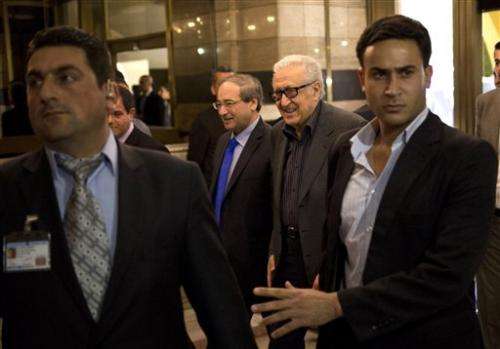Interview: UN seeks Syria polio access

The U.N.'s health agency said Tuesday it has confirmed 10 polio cases in northeast Syria, the first confirmed outbreak of the highly contagious disease in the country in 14 years, and a top U.N. official urged warring sides to grant health workers access to 500,000 children who have never received immunization.
Officials are awaiting lab results on another 12 cases showing polio symptoms, said World Health Organization spokesman Oliver Rosenbauer. He said the confirmed cases are among babies and toddlers, all under two. Syria's civil war, which began nearly three years ago, has caused medical and other government services in many areas to collapse.
The announcement came as U.N.-Arab League envoy to Syria Lakhdar Brahimi met with a senior opposition figure in Damascus as part of a diplomatic push to convince all sides in the country's civil war to attend an international peace conferenced planned in Geneva next month.
The polio virus usually infects children in unsanitary conditions through the consumption of food or liquid contaminated with feces. It attacks the nerves and can kill or paralyze, and can spread widely and unnoticed before it starts crippling children.
"This is a communicable disease—with population movements it can travel to other areas," said Rosenbauer. "So the risk is high of spread across the region."
UNICEF Executive Director Anthony Lake, on a visit to Damascus, said the polio outbreak "now is not only a desperate issue for Syria, but it becomes part of the global issue as well."
In an interview with The Associated Press, he said the U.N. children's agency and WHO plan to immunize 2.4 million children throughout the country, of whom over 500,000 have never been vaccinated against the disease.
Lake said that he held "businesslike and encouraging" discussions with senior Syrian officials over issues concerning access to war zones, where children live in often desperate conditions. He said negotiations with the rebels still have to be conducted.
"Vaccinations and immunizations have absolutely no political content, they have no relationship to any military issues and therefore there is every reason ... (to) believe we will gain access into these communities," he said.
"Anytime you have half a million or more children who have not been reached with lifesaving vaccinations, then it is very urgent that you be able to get in to vaccinate them," he added.
Syria had launched a vaccination campaign around the country days after the Geneva-based WHO said it had received reports of children showing symptoms of polio in Syria's Deir el-Zour province, but the campaign faces difficulty with lack of access in many parts of the war-torn country.
Nearly all Syrian children were vaccinated against the disease before the civil war began more than 2 ½ years ago. Polio was last reported in Syria in 1999.
The Syrian conflict, which began as a largely peaceful uprising against President Bashar Assad in March 2011, has triggered a humanitarian crisis on a massive scale, killing more than 100,000 people, driving nearly 7 million more from their homes and devastating cities and towns.
U.N. officials have warned of the spread of disease in Syria because of lack of access to basic hygiene and vaccinations.
Meanwhile, U.N.-Arab League envoy Brahimi held talks with Hassan Abdul-Azim, head of the Damascus-based National Coordination Body for Democratic Change in Syria. The group has called for regime change through peaceful means and is not part of the Western-backed opposition Syrian National Coalition or affiliated with rebel groups fighting to topple the Syrian president.
Abdul-Azim said Brahimi told him the U.S. and Russia are determined to hold the peace conference next month.
One of the key sticking points in getting the opposition to agree to the talks is the issue of Assad's future. Much of the opposition rejects any transition plan in which he or his close associates are involved.
Abdul-Azim told The Associated Press that Assad's position "will be dealt with through negotiations with Syrian sides who will decide the fate of the president and the regime."
The trip is part of Brahimi's efforts to convene a long-delayed peace Geneva conference, although fundamental disagreements over the agenda and participants remain, making it unclear whether the gathering will indeed take place.
© 2013 The Associated Press. All rights reserved.














